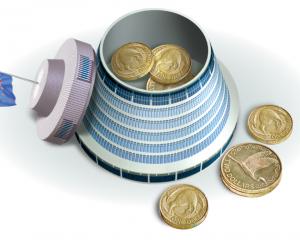Nor is it normally the case that Government allies who will vote for the Budget are criticising it, while the parties that will not vote for it are praising it.
Yet Finance Minister Bill English's pre-Budget speech prompted cries of "quelle horreur'' from the Right and accolades from the Left.
That was because Mr English effectively called off tax cuts for this year and next year.
Instead, he would pay off debt.
The Greens were quick to report Mr English had "made the right move''.
The Right did not believe it was the right move at all.
Act leader David Seymour said National had "no spine''.
The Taxpayers' Union said National's low tax policy was "a sham''.
The angst of National's allies and its conservative rump is understandable.
First a National Government increases base welfare rates as the centrepiece of its 2015 Budget and then it backs off from tax cuts.
What fresh hell is this from a supposedly conservative party?
On the face of it, it looked like a broken promise.
National wafted the scent of tax cuts during the 2014 election campaign.
Mr English and Prime Minister John Key have since continued to insist it was on the radar for 2017.
When Mr English revealed he had given himself a bigger than usual stash of pocket money to play with in 2016 and 2017, the punters could all but hear that coin hitting the bank accounts.
The reasons Mr English gave for changing tack were fiscal.
He traded in tax cuts for debt, for infrastructure spending and for boosts in health and education to help pay for surging population growth.
The stronger reason for scrapping the tax cuts are political.
Tax cuts can be popular, but there was hardly a clamour for them. In 2008, that appetite may have been there.
Back then it had been a long time between drinks and interest rates were much higher.
The problem is that even modest tax cuts are horrendously expensive and a small tax cut can do more political harm than no tax cut at all.
Labour learnt that in 2005 when it proposed tax cuts that would have delivered just 67c to many people and not until three years later.
National called that the Chewing Gum Budget.
It nearly cost Labour the election and even when it upgraded to a Block of Cheese tax cut programme in 2008, that was not enough to save it.
That will be uppermost in National's thinking.
The now abandoned tax cut package it was considering was probably a $1billion package aimed mainly at addressing bracket creep.
It would have delivered just $4 to $8 a week to many people.
That is the price of an avocado in today's market.
That makes the tax cuts look ideological and National is paranoid about looking out of touch.
In looking for a feel-good factor out of a Budget, National has calculated it will get more kudos from putting money into health and education rather than returning a few paltry coins into people's pockets.
The party which will be most disappointed by the decision not to forge ahead with tax cuts is Labour.
A tax cut programme from National would give Labour a lot of ammunition.
If Labour could make hay out of coming up with better ideas for the $25 million spent on the flag referendum, imagine the damage it could do with a $1 billion tax package nobody really wanted or needed.
That amount is good for a fair chunk of life-saving drugs and paid parental leave.
National is also trying to address one of its Achilles heels on economic credibility: debt levels.
Having reached the blunt target of surplus, Mr English's new target is to pay down debt to 20% of GDP by 2020.
Current net Crown debt is at 25% and forecast to shrink just to 24% by 2020.
It may well have been unavoidable, given the Christchurch earthquake and Global Financial Crisis, but in terms of blunt statistics net debt has climbed from 6% when Labour left office in 2008 to 25% now.
It is not a good look.
Labour could have bludgeoned National about spending up large on tax cuts but it can hardly criticise National for focusing on debt.
It has spent the past eight years criticising National for not focusing on debt.
The tax cuts are on hold for now, but National is increasingly confident it can win in 2017 and when it comes to tax cuts, timing is everything.
They will not be given this year, partly because tax cuts are a cure for an ailment which does not yet exist. Interest rates have been low for so long people have begun to take them for granted.
It has become the norm.
When they eventually do go up, people with the mortgages on those unaffordable homes in Auckland will feel the sting.
National will need tools to put money back into people's pockets to soften that shock.
Delaying tax cuts leaves National with options.
Nor will tax cuts be in the 2017 Budget.
If National includes tax cuts in that Budget, it will have to put aside money for when they come into effect a year later.
That would effectively hand Labour a handy, pre-allocated package of $1 billion to fund its own 2017 policy promises by saying it would simply cancel the tax cuts to do so.
That would neutralise National's most effective campaign tool - the "show me the money'' line questioning whether Labour can pay for its promises.
Even as Mr English ruled out any move in the 2016 and 2017 Budgets, he added that lowering income taxes remained a Government priority.
It was just that it was one priority that had been deprioritised for a while.
That will be a temporary state of affairs.
Expect them to be reprioritised come the 2017 election campaign.
That campaign tax package is likely to involve more far-reaching reform of the tax system than tutuing with brackets to adjust for salary increases.
Labour was not the only party to learn a lesson from the derision that came with its 2005 Chewing Gum Budget.
It was a salutary lesson that with tax cuts, size does matter.
- Claire Trevett is The New Zealand Herald deputy political editor.









